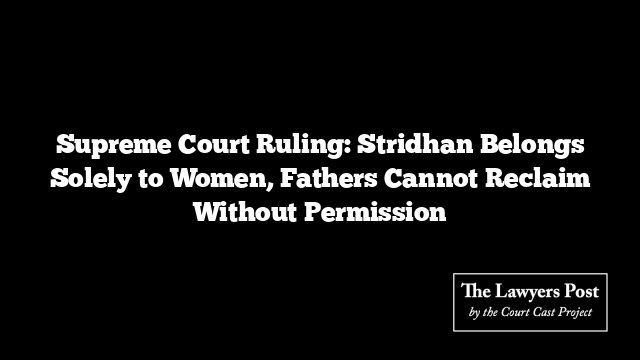In a significant ruling, the Supreme Court has clarified that dowry and traditional wedding gifts given at the time of marriage are not automatically assumed to be entrusted to the bride’s parents-in-law. This decision came as the Court revisited Section 6 of the Dowry Prohibition Act, 1961, which stipulates that any dowry received by someone other than the bride must be handed over to her within a specified timeframe. The failure to do so can result in imprisonment or fines.
The bench, consisting of Justice JK Maheshwari and Justice Sanjay Karol, made this observation while quashing an FIR lodged by the father of a divorced woman. The complaint sought the recovery of his daughter’s ‘stridhan’—gifts and ornaments given at the time of her marriage—from her former in-laws. The case had earlier led to charges under Section 406 of the IPC (criminal breach of trust) and Section 6 of the Dowry Prohibition Act.
Citing the precedent set in Bobbili Ramakrishna Raja Yadad & Ors. v. State of Andhra Pradesh, the Court emphasized that the mere giving of dowry and traditional gifts at a wedding does not imply that these items are entrusted to the parents-in-law, thereby invoking Section 6 of the Dowry Prohibition Act. The Court also found that beyond the complainant’s statement, there was no evidence proving that the in-laws possessed the ‘stridhan’.
Moreover, the Supreme Court noted that a Separation Agreement between the woman and her ex-husband had already settled all matters, including the distribution of personal belongings, at the time of their divorce. This agreement, which released both parties from any further claims, invalidated the charges under Section 6 of the Dowry Prohibition Act.
The Court also highlighted the timing of the FIR, which was filed in 2021—six years after the divorce and three years after the woman remarried. It underscored that criminal proceedings are intended to deliver justice, not to serve as a tool for revenge or vendetta, and criticized the unexplained delay in filing the complaint.
As a result, the Supreme Court overturned the Telangana High Court’s ruling, effectively dismissing the complaint.





